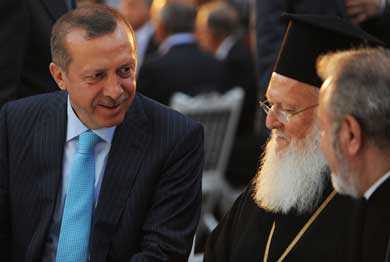By Costas Iordanidis
In yet another striking gesture, Turkish Prime Minister Recep Tayyip Erdogan has announced that the state will return properties confiscated from religious minorities since 1936.

The decision, announced in front of representatives of Istanbul’s Christian and Jewish communities, has been received with a mix of satisfaction and skepticism.
A tactical characteristic that distinguishes Erdogan from his predecessors is the treatment of non-Muslim communities in Turkey. Visits by Ecumenical Patriarch Vartholomaios to Christian sacred sites in the Black Sea have boosted the image of Turkey as a state that respects and encourages religious and ethnic diversity — very much in line with European Union demands. His latest announcement regarding the seized assets, pretty much serves the same objective.
Regardless of the motives behind Erdogan’s revisionist policy (whether that is substantial or not) toward Turkey’s religious minorities, Athens officials must keep in mind that Ankara may at some point raise the issue of reciprocity; and that will be hard to duck by invoking “legal” arguments and interpretations of past deals between the two countries.
Erdogan has adopted an “aggressive” policy toward Greece — but not in the classic confrontational sense. He is “aggressive” in the sense that he likes to undertake unilateral initiatives that aim to set a precedent. In contrast, Greece has traditionally kept a defensive stance, putting forward arguments based on international law and other agreements mostly centered around the Treaty of Lausanne.
This practice, which has for decades been adopted by successive Greek governments, is considered safe but its main weakness is that any talks held in this context will most probably lead to broader settlements. Greece and Turkey have for years held talks on the delineation of the continental shelf — which is, in theory, a legal issue — but the two sides are effectively discussing the sum of Aegean Sea differences.
The prospect of exploiting the Aegean’s oil and gas reserves is perhaps making some politicians here all too keen to wrap up negotiations. However, if Greece is really anxious to drill for the resources (if they exist), it would be wise to neither ignore Ankara’s reactions nor rush to settle any outstanding disputes with Turkey.
There’s always room for ad hoc solutions that enable joint action without prior settlement of more substantial issues.
via ekathimerini.com | Property returns. What now?.

Leave a Reply